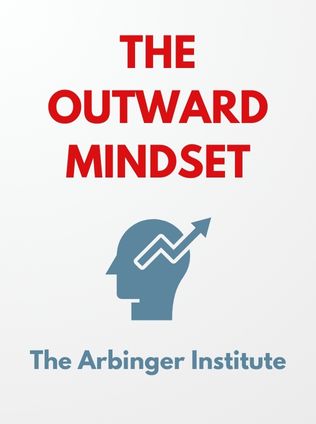
The Outward Mindset
Seeing Beyond Ourselves
By The Arbinger Institute
Published 06/2016
About the Author
The Arbinger Institute is a world-renowned organization specializing in training, consulting, coaching, and providing digital tools aimed at transforming individuals and organizations through mindset change. With a track record spanning over 35 years, Arbinger is a leader in leadership development, team building, conflict resolution, crisis management, and culture change. Their profound expertise in these areas has enabled countless individuals and organizations to achieve sustainable improvements in performance, collaboration, and innovation.
Main Idea
"The Outward Mindset: Seeing Beyond Ourselves" by The Arbinger Institute focuses on transforming individual and organizational performance by shifting from an inward, self-centered mindset to an outward, others-inclusive mindset. This shift enables people to see beyond their own goals and consider the needs and objectives of others, fostering a culture of collaboration, accountability, and sustainable success.
Table of Contents
- Introduction
- Part I: Something New
- Part II: Exploring the Outward Mindset
- Part III: Becoming More Outward
- Part IV: Multiplying the Mindset Change
Introduction
The Arbinger Institute introduces the concept of the outward mindset by asking readers to think of people they admire and respect. These individuals likely possess an outward mindset, making others feel valued and seen. The book emphasizes that shifting from a self-focused inward mindset to an outward mindset can transform relationships and organizational performance. As Paul Hubbard, CEO of a healthcare company, explains:
"Leaders fail by coming in saying, 'Here's the vision. Now you go execute what I see.' Although leaders should provide a mission or context and point toward what is possible, what humble, good leaders also do is to help people see." - Paul Hubbard
The introduction sets the stage for understanding the profound impact of mindset on behavior and performance. It emphasizes that the way we see others—either as people with their own needs and challenges or as objects to be used—shapes our interactions and effectiveness in profound ways. By recognizing this, leaders and individuals can begin to shift their perspective and achieve greater success and fulfillment.
Part I: Something New
This section discusses how behavior is shaped by mindset. Traditional approaches to personal improvement and organizational transformation focus on replicating behaviors that drive results. However, the Arbinger Institute argues that mindset is the underlying driver of behavior. Without addressing mindset, behavior change efforts often fail. Studies by McKinsey & Company support this, showing that addressing pervasive mindsets significantly increases the likelihood of successful organizational change.
Two core problems with a purely behavioral approach are highlighted:
- The behaviors people choose are influenced by their mindset.
- The effectiveness of behaviors depends on the individual's mindset.
By improving mindset, individuals naturally adopt behaviors that drive results without needing prescriptive changes. The Arbinger Institute illustrates this concept with examples from various organizations that have successfully implemented mindset change, leading to sustained improvements in performance and employee engagement.
For instance, a company struggling with collaboration issues found that by addressing the underlying mindsets of its employees, they were able to foster a more cooperative and innovative work environment. This shift not only improved team dynamics but also led to increased productivity and job satisfaction.
Part II: Exploring the Outward Mindset
This section explores the two primary mindsets: inward and outward. An inward mindset focuses on personal needs and objectives, viewing others as obstacles or tools to achieve one's goals. In contrast, an outward mindset considers the needs, objectives, and challenges of others, fostering collaboration and collective success. The goal is to move individuals and organizations towards the outward mindset end of the continuum.
The book emphasizes the importance of seeing others as people with their own needs and challenges rather than objects to be used or obstacles to overcome. This shift in perspective enables better thinking and positive change. The Arbinger Institute uses real-life examples to illustrate how organizations that embrace an outward mindset achieve higher levels of performance and employee satisfaction.
Sign up for FREE and get access to 1,400+ books summaries.
You May Also Like
The Subtle Art of Not Giving a F*ck
A Counterintuitive Approach to Living a Good Life
By Mark MansonRich Dad Poor Dad
What the Rich Teach Their Kids About Money - That the Poor and Middle Class Do Not!
By Robert T. KiyosakiHow To Win Friends and Influence People
The All-Time Classic Manual Of People Skills
By Dale CarnegieQuiet: The Power of Introverts
The Power of Introverts in a World That Can't Stop Talking
By Susan Cain



















